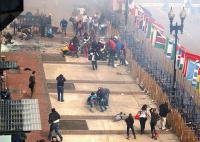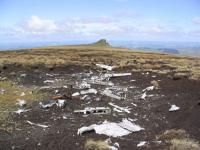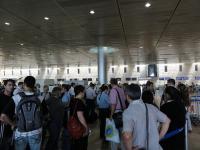-
Biodefense Panel welcomes key provision in defense authorization bill
In October 2015, the Blue Ribbon Study Panel on Biodefense found that insufficient federal coordination on strategy, budgeting, and policy; inadequate collaboration with other levels of government and the private sector; and lagging innovation in areas like biosurveillance and medical countermeasure development make the United States vulnerable to biological attacks and infectious disease outbreaks. The Panel welcomed the passing by the House of the National Defense Authorization Act, H.R. 4909, which includes a provision addressing one of the Panel’s most important recommendations.
-
-
Update on earthquakes: Newest results from Oklahoma Commission look “encouraging”
The Oklahoma Corporation Commission (OCC), the regulatory agency overseeing the state’s oil and gas industry, now has data that may suggest their directives to owners of production and induction wells have successfully contributed to a decline in seismic activity in the most volatile areas prone to earthquakes.Scientists at the Oklahoma Geological Survey (OGS) continue to remind the public that there are a wide variety of unanswered questions about immediate and long-term remedies even with the new directives in place.
-
-
ISIS conducting chemical experiments on its prisoners
In the ace of sustained attacks by coalition forces, ISIS has moved its chemical weapons labs to densely populated residential areas in Mosul — and is testing homemade chlorine and mustard gas on its prisoners held in different facilities in and around the city. ISIS has been working in chemical weapons for a while, relying on the expertise of scientists who served in the chemical weapons complex of Saddam Hussein, but also on Europeans with chemical degrees from leading European universities.
-
-
ISIS leader calls on U.S., European followers to attack in U.S. and Europe during Ramadan

Abu Mohammed al-Adnani, a close aide and a possible successor to leader Abu Bakr al-Baghdadi, has called on the international followers of ISIS to carry out attacks on civilians during the holy month of Ramadan. He said that lone wolf attacks in the United States and Europe were “dearer to us than the biggest action by us” in Iraq and Syria. The message also contained references to recent military setbacks the group has suffered.
-
-
ISIS urges Indian Muslims to avenge killing of Muslims

ISIS, in a surprising move, has appealed to India’s Muslim minority, calling on them to avenge the deaths of Muslims killed during riots in Indian Prime Minister Narendra Modi’s home state of Gujarat. Only a handful of India’s 160 million Muslims have joined ISIS. Indian leaders has stressed that the reason is the strength of the country’s secular democracy.
-
-
Changing land uses in California will drive water needs beyond available supply
If past patterns of California land-use change continue, projected water needs by the year 2062 will increase beyond current supply. If historical trends of land use changes to or from urban, agricultural or other uses continue, the result will be increased water-use demand beyond what existing supplies can provide. Large uncertainties associated with weather and climate variability have the potential to exacerbate the problem.
-
-
Search lead by Egypt's military finds plane wreckage north of Alexandria

An Egypt-led search has uncovered “wreckage” and “personal belongings of passengers.” “Egyptian aircraft and navy vessels have found personal belongings of passengers and parts of the wreckage 290 kilometers (180 miles) north of Alexandria,” Egyptian army spokesman Mohammed Samir in a statement published on Facebook. Thursday’s even is but the latest in a troubling series of aviation crises in Egypt this past year.
-
-
Israel’s airport security model may not be suitable for European airports

Israel has a justified reputation as a country offering tight aviation and airport security. Thus, although Israel has been the targets of various forms of terrorism for decades, no one has been killed or wounded inside Ben Gurion airport, or on board an aircraft departing from the airport, for the last forty-four years. Experts say that Europe cannot emulate all aspects of Israel’s approach to aviation security, but that the core idea — that potentially higher risk passengers should be singled out as early as possible before they board the plane – should be adopted, subject to European laws and norms.
-
-
Iran supporting Assad to help Hezbollah fight Israel, experts tell Senate
Iran is propping up the regime of Syrian dictator Bashar al-Assad in order to ensure that Hezbollah, which both countries support, has the continued capability to wage war against Israel, expert witnesses told the Senate Foreign Relations Committee at a hearing Tuesday.
-
-
Federal border officials in El Paso accused of coercion, abuse
Federal officials stationed on the Texas-Mexico border called legal border crossers “whores” and criminals and subjected them to unwarranted searches and coercion, according to a complaint a civil liberties group submitted to the Department of Homeland Security’s inspector general Tuesday.
-
-
Presidential campaigns spied on by foreign hackers with “a variety of motivations”
National Intelligence Director James Clapper said that the campaigns of all the candidates for president are being spied on by foreign hackers with “a variety of motivations.” Clapper said that the acts of espionage against the campaigns may only just be getting started. “As the campaigns intensify we’ll probably have more of it,” Clapper noted.
-
-
France to employ anti-drone technology to protect Euro 2016 soccer games
France will employ anti-drone technology to interfere with and take control of any flying machines breaching strict no-fly zones over stadiums where the games of the 2016 European Soccer Championship will be played. The technology is part of broad and unprecedented security measures taken to secure Europe’s biggest sports event. French security agencies have been training for some time for the possibility of drones used to disperse chemical agents over crowds.
-
-
We know where you live
Researchers have shown that the location stamps on just a handful of Twitter posts — as few as eight over the course of a single day — can be enough to disclose the addresses of the poster’s home and workplace to a relatively low-tech snooper. The tweets themselves might be otherwise innocuous — the location information comes from geographic coordinates automatically associated with the tweets.
-
-
With drought easing, California rolls back water conservation rules
California announced on Wednesday that it was rolling back mandatory water conservation rules which were put in place at the height of a 4-year drought. The decision to roll back the restrictions came after water conditions in many parts of the state have improved as a result of a wet winter.
-
-
Senate approves bill allowing 9/11 victims to sue Saudi Arabia
The Senate has approved a bill which would allow the families of 9/11 victims to sue Saudi officials for damages. A 1976 law granting states sovereign immunity form such law suits has thwarted efforts by the families of 9/11 victims to use the courts, but the bill just approved by the Senate would circumvent the 1976 law by allowing lawsuits against governments of countries found to be involved in terrorist attacks on U.S. soil. President Barack Obama has said he will veto the legislation.
-
More headlines
The long view
What Does Netflix’s Drama “Adolescence” Tell Us About Incels and the Manosphere?
While Netflix’s psychological crime drama ‘Adolescence’ is a work of fiction, its themes offer insight into the very real and troubling rise of the incel and manosphere culture online.
A Shining Star in a Contentious Legacy: Could Marty Makary Be the Saving Grace of a Divisive Presidency?
While much of the Trump administration has sparked controversy, the FDA’s consumer-first reforms may be remembered as its brightest legacy. From AI-driven drug reviews to bans on artificial dyes, the FDA’s agenda resonates with the public in ways few Trump-era policies have.
The Center Can Hold — States’ Rights and Local Privilege in a Climate of Federal Overreach
As American institutions weather the storms of executive disruption, legal ambiguity, and polarized governance, we must reexamine what it means for “the center” to hold.
How to Reverse Nation’s Declining Birth Rate
Health experts urge policies that buoy families: lower living costs, affordable childcare, help for older parents who want more kids
Foundation for U.S. Breakthroughs Feels Shakier to Researchers
With each dollar of its grants, the National Institutes of Health —the world’s largest funder of biomedical research —generates, on average, $2.56 worth of economic activity across all 50 states. NIH grants also support more than 400,000 U.S. jobs, and have been a central force in establishing the country’s dominance in medical research. Waves of funding cuts and grant terminations under the second Trump administration are a threat to the U.S. status as driver of scientific progress, and to the nation’s economy.
The True Cost of Abandoning Science
“We now face a choice: to remain at the vanguard of scientific inquiry through sound investment, or to cede our leadership and watch others answer the big questions that have confounded humanity for millennia —and reap the rewards.”
